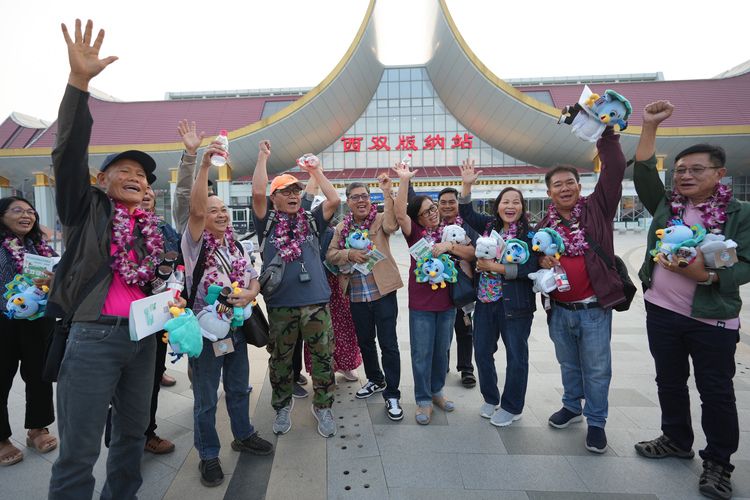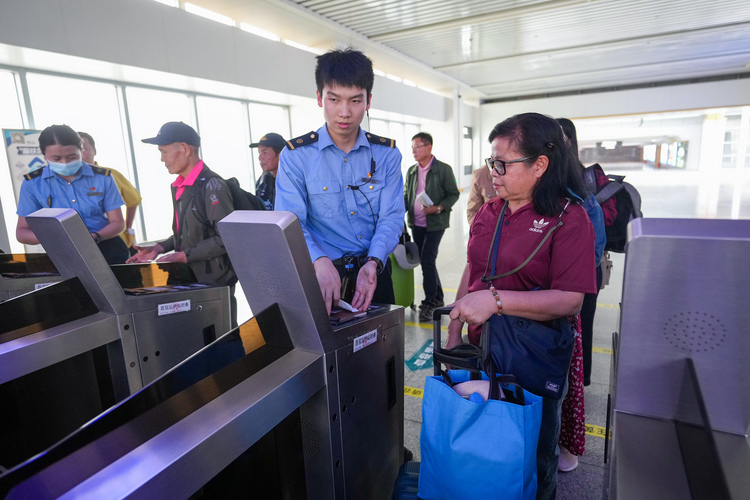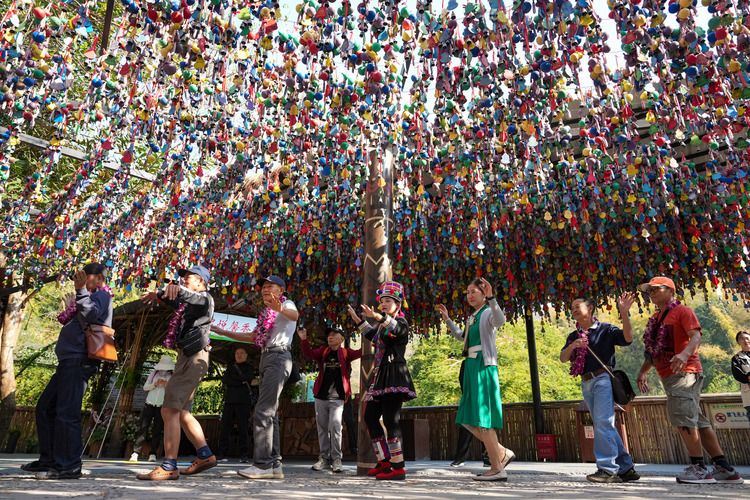* Since Feb. 10, tour groups from ASEAN countries have been allowed to visit Xishuangbanna, a popular tourist destination in Yunnan Province, without a visa for up to six days.
* In 2024, Xishuangbanna received 319,500 overseas visitors, a year-on-year increase of 264.67 percent. Laos, Thailand and Myanmar were the top contributors.
* People-to-people exchanges between China and ASEAN are entering a new stage, with deeper cooperation in tourism, culture and other fields.
KUNMING, Feb. 22 (Xinhua) -- On Friday, a group of 15 tourists from Thailand and Laos wrapped up their four-day trip to southwest China's Xishuangbanna Dai Autonomous Prefecture, boarding the China-Laos Railway for their return journey.
It is the first tour group from the Association of Southeast Asian Nations (ASEAN) member states to travel to the prefecture since China introduced its new visa relaxation policy. Since Feb. 10, tour groups from ASEAN countries have been allowed to visit Xishuangbanna, a popular tourist destination in Yunnan Province, without a visa for up to six days.

Tourists from a tour group, the first one from the Association of Southeast Asian Nations (ASEAN) member states since China introduced its new visa relaxation policy, pose for photos in front of the Xishuangbanna railway station in Jinghong City, Xishuangbanna Dai Autonomous Prefecture, southwest China's Yunnan Province, Feb. 18, 2025. (Xinhua/Chen Xinbo)
China and ASEAN have long been key tourist markets for each other. Official data showed that in 2024, Xishuangbanna received 319,500 overseas visitors, a year-on-year increase of 264.67 percent. Laos, Thailand and Myanmar were the top contributors.
This visa exemption policy marks the start of a new chapter in cultural exchanges and cooperation between China and ASEAN, said Qi Xiaobo from the Institute of Geographic Sciences and Natural Resources Research under the Chinese Academy of Sciences, adding that it signals China's dedication to strengthening ties with the regional bloc.
GROWING TOURISM INDUSTRY
"Still want more," Somnham Sithone, a Lao tourist in the group, said after visiting Xishuangbanna Virgin Forest Park. He also experienced a 7D movie featuring the Mekong River. "It is a perfect blend of nature and technology. I hope to explore more places in China."
Guided by a local travel agency, the tour group was immersed in natural scenery, sampled local cuisine and experienced Dai ethnic culture, including a traditional Dai dance and a water blessing ceremony.
"Even though they are the first group with visa-free access, coordination between the border inspection bureau, public security bureau and travel agency has been smooth and efficient," said Yu Hanla, the group's tour guide.

Staff members help tourists from a tour group, the first one from the Association of Southeast Asian Nations (ASEAN) member states since China introduced its new visa relaxation policy, check out of Xishuangbanna railway station in Jinghong City, Xishuangbanna Dai Autonomous Prefecture, southwest China's Yunnan Province, Feb. 18, 2025. (Xinhua/Chen Xinbo)
According to Jiang Jie, deputy director of the culture and tourism bureau of Xishuangbanna, the prefecture has launched 18 tourist routes, offering the opportunity to explore the area's heritage and experience its culture.
"We are designing more diverse routes tailored to ASEAN tourists, including tropical rainforest adventures and ethnic cultural activities," said Liu Jun, general manager of a local travel agency.
The influx of tourists is also a boon for hospitality, travel agencies and other sectors, and promotes the development of infrastructure, Qi said. He also emphasized the importance of enhancing services for international visitors, such as multilingual guides and signage, and financial services.
Yu, who has nearly 10 years of experience as a tour guide and speaks both Thai and Lao in addition to her native tongue, returned to her hometown of Xishuangbanna from Beijing after the launch of the China-Laos Railway. "It is fulfilling to work in my hometown, and it provides a good income," she said.
DEEPENING CULTURAL TIES
Cultural exchanges between China and ASEAN are expanding beyond tourism. As Chinese culture gains influence across the region, an increasing number of people from ASEAN countries are eager to learn the Chinese language.

Tourists from a tour group, the first one from the Association of Southeast Asian Nations (ASEAN) member states since China introduced its new visa relaxation policy, dance with Chinese tourists and staff members at a scenic spot in Xishuangbanna Dai Autonomous Prefecture, southwest China's Yunnan Province, Feb. 19, 2025. (Xinhua/Chen Xinbo)
Fluent in Mandarin, Le Anh Lien, a 24-year-old from Vietnam, introduces Vietnamese specialties to customers in a cross-border food shop at Tianbao Port in Malipo County. Her language proficiency helped her secure her first job in Yunnan.
According to a report from VietnamWorks, a job platform in Vietnam, students proficient in Chinese have an almost 100 percent chance of securing employment after graduation.
The number of Lao students learning Chinese is also on the rise, with many pursuing vocational training in fields like logistics, e-commerce, tourism management and sports, said Zhou Bo, head of a vocational school in Mengla County in Xishuangbanna, adding that the school expects to welcome more than 500 new Lao students on Sunday.
Data shows that the number of exchange students between China and ASEAN countries has surpassed 175,000, and collaborative projects between schools continue to grow, expanding the talent pool for both sides.
"People-to-people exchanges between China and ASEAN are entering a new stage, with deeper cooperation in tourism, culture and other fields," said Jia Chaozhishan with the Yunnan Academy of Social Sciences.
(Reporting by Wang Yihan, Ji Zhepeng, Wang Xiansi; video reporter: Xiong Xuanang; video editors: Zhang Yueyuan, Luo Hui, Yu Jiaming)
编辑:韩睿